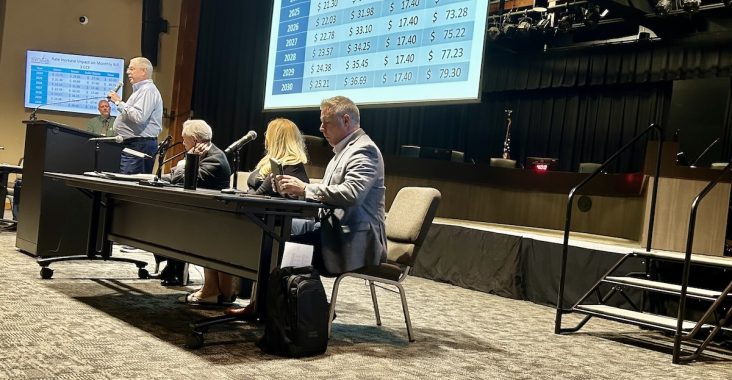Fort Smith officials face frustrated audience at consent decree public hearing
by September 9, 2024 8:52 pm 1,942 views

Fort Smith City Administrator Carl Geffken speaks Monday (Sept. 9) during a public hearing about a federal consent decree faced by the city.
Fort Smith officials engaged with around 65 people, gathered Monday (Sept. 9) for a public hearing, on what the city is up against to continue meeting a federal mandate to fix the city’s sewer system that is estimated to cost $635 million.
After decades of failing to maintain water and sewer infrastructure to federal standards, the city entered into a federal consent decree with the U.S. Environmental Protection Agency (EPA) and U.S. Department of Justice (DOJ) in late 2014, with the decree officially beginning Jan. 1, 2015. The consent decree, when initially enacted, required the city to make an estimated $480 million worth of sewer upgrades in 12 years.
The city spent around $49 million prior to enactment of the consent decree, and spent $87 million on consent decree work between 2015 and 2019. Between 2020 and 2023, the city spent $64.1 million on consent decree work. The total for the work, including prior to 2015, is around $200 million.
The problem is, the estimated cost of the work required to meet the full measure of the federal mandate is $635 million. Also, the city faces a possible $25 million penalty if state and federal officials do not approve a city plan to modify the federal consent decree. Part of that plan includes pushing the consent decree deadline to 2036.
Geffken said the consent decree resulted from many decades of the city not adequately maintaining the city’s sewer system. He said the “can has gotten kicked down the road” and now those living in Fort Smith are being asked to “step up and fix it.”
“What we’re trying to do is make this affordable,” Geffken said.
City Director Lavon Morton said there is a large difference between the revenue the city now generates and the cost of the mandated work. He said this is “the first chance the city has” to work with the federal agencies on an extension that is affordable.
“We’ve got a find a way to bridge that $500 million gap. … But do that in a way that does not burden the residents of the city,” he said.
To Morton’s point, city officials are working to negotiate with the federal agencies to push the consent decree work to 2036. But that will require, according to city officials, a detailed plan that proves to the federal agencies that the city will adequately fund the mandated work and the city has a responsible plan to complete the work.
Most of the public comments were adversarial, questioning the transparency of the previous spending, pushing back against past comments from city officials about addressing the federal mandates, and suggesting the city needed “new eyes” to address the issue. The city also was challenged to seek more money from grant programs.
Fort Smith attorney Joey McCutchen, who spoke during the hearing, said the only time the city asks for input “is when they are coming to reach in our pocketbook.”
“I don’t think the city has the resolve to solve this problem. I don’t think they have their priorities in the place. I think we continue to see the sanitary sewer overflows polluting our city,” McCutchen said in a brief interview with Talk Business & Politics.
A second and final public hearing on the effort to renegotiate a consent decree is set for 6 p.m., Sept. 12, at the Blue Lion in downtown Fort Smith.
